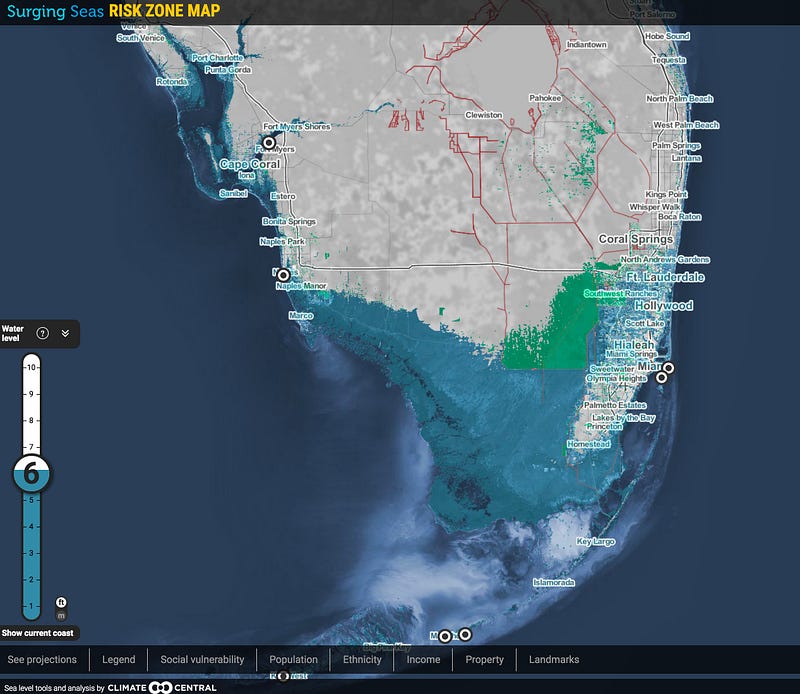Trump falsely claims Paris deal has a minimal impact on warming
It may be time to sell your coastal property.

By exiting the Paris climate deal, President Donald Trump has made this future for South Florida and “Miami Island” all but unstoppable. CREDIT: Climate Centra
lPresident Donald Trump announced Thursday that the United States will withdraw from the Paris climate accord. In doing so, he has made the worst-case impacts of climate change on America vastly more likely.
In a speech from the White House Rose Garden filled with thorny lies and misleading statements, one pricks the most: Trump claimed that the Paris climate deal would only reduce future warming in 2100 by a mere 0.2°C. White House talking points further assert that “according to researchers at MIT, if all member nations met their obligations, the impact on the climate would be negligible… less than .2 degrees Celsius in 2100.”
The Director of MIT’s System Dynamics Group, John Sterman, and his partner at Climate Interactive, Andrew Jones, quickly emailed ThinkProgress to explain, “We are not these researchers and this is not our finding.”
They point out that “our business as usual, reference scenario leads to expected warming by 2100 of 4.2°C. Full implementation of current Paris pledges plus all announced mid-century strategies would reduce expected warming by 2100 to 3.3°C, a difference of 0.9°C [1.6°F].”

The 0.2°C estimate used by Trump may be from another MIT group; the Joint Program on the Science and Policy of Global Change did have such an estimate in early 2015, before all of the Paris pledges were in. But, their post-Paris 2016 analysis also concluded the impact of the full pledges was closer to 1°C.
In their analysis, Sterman and Jones “take all nations at their word that they will fully meet their national commitments. If nations increase their ambition and set future pledges, as is outlined in the agreement, then the positive impact would be even larger.”
This point is key. The Paris commitments not only help the globe avoid the worst-case scenario for total warming and related climate impacts, they keep the best-case scenario open. Indeed, the Paris pledges buy us another decade close to the 2°C (3.6°F) path.
Keeping the option of beating the 2°C target?—?which is widely seen by scientists as the point at which climate impacts start to become dangerously unmanageable by humans?—?is a key objective of the Paris deal.
Earth has already warmed 1°C from carbon pollution, and the latest science says the globe is already approaching many tipping points. Among the most imminent and consequential for America and the world involves sea level rise.
The disintegration of the Greenland and Antarctic ice sheets is speeding up, providing more evidence we are headed for the worst-case scenario of sea level rise?—?three to six feet (or more) by 2100?—?unless total warming is limited to “well below 2°C,” as Paris envisions.
And Trump is not merely working to thwart both domestic and global climate action, he slashes funding for coastal adaptation in his latest budget.
But this is not just South Florida’s problem. The entire country is facing a trillion-dollar bubble in coastal property values.
So when will the bubble burst? In short, when sellers outnumber buyers, and banks become reluctant to write 30-year mortgages for doomed property, and insurance rates soar, then the coastal property bubble will slow, peak, and crash. The process speeds up when a large fraction of the financial community?—?mortgage bankers and opinion-makers, along with a smaller but substantial fraction of the public?—?realize that it is too late to stop catastrophic sea level rise.
With Trump withdrawing the U.S. from the Paris agreement, that moment would appear to be at hand, which leaves one final question: Who will be the smart money that sells their coastal property early?—?and who will be the other kind of money?
thinkprogress.org |






